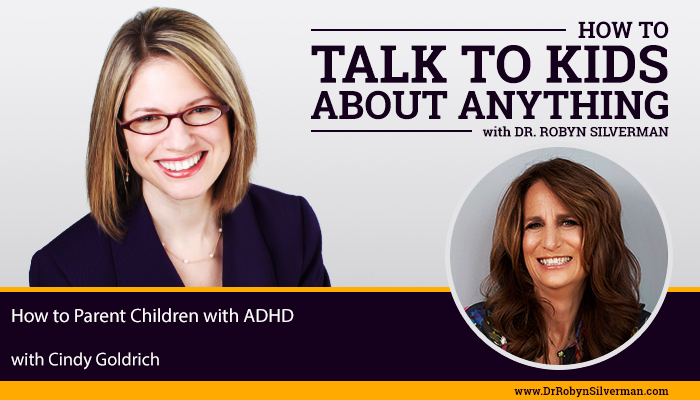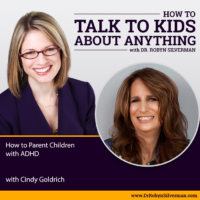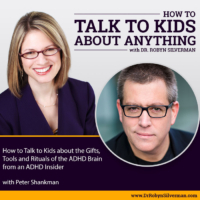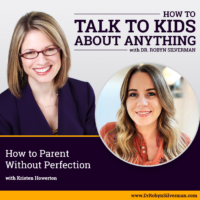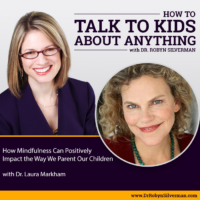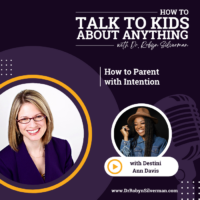Podcast: Play in new window | Download
Subscribe: Apple Podcasts | RSS | More
How to Parent Kids with ADHD
This podcast will focus on how to parent kids with ADHD.
Special guest: Cindy Goldrich
My next guest wants to know—does any of this sound familiar?
“They say he’s just lazy, but I’m not sure.”
“I think she’s just not motivated, but how can I tell?”
“It seems like he can pay attention if he wants to, so how do I get him to pay attention when he should?” 
“I’ve considered putting her on medication, but I have my concerns.” “My child was diagnosed with ADHD—so what can I do?”
For those who parent or teach kids who have ADHD, it might seem that we are often engaged in a battle of wills and wits. But as we will discuss today, kids who are diagnosed with ADHD don’t want to make life so challenging and difficult for you – or themselves! Having a child with ADHD can bring chaos and stress into the home and the classroom. Although children with ADHD can often appear lazy, unmotivated or manipulative, when you dig deeper you will find this is often not the case. Our next guest- is going to help us understand ADHD and how we can best help our kids who want to thrive but are often misunderstood and don’t quite fit into the mold schools and programs have designed to teach the more typical learner.
Cindy Goldrich is a mental health counselor, certified ADHD Clinical Service Provider, and teacher trainer. As an ADHD Specialist, She supports parents, educators and other professionals to address the impact of ADHD & Executive Functioning on learning, motivation, and behavior.
She is a recognized Keynote speaker and provides Professional Development for school districts and other professional organizations worldwide addressing how ADHD and executive function challenges affect children and how to help boost behavior and performance in school and at home.
Cindy is the author of 8 Keys for Parenting Children with ADHD, a book recognized for providing parents, educators, and therapists with a practical, easy-to-read guide for addressing challenging kids and ADHD, Executive Function, and Behavior in the Classroom (expected printing Aug. 2019). Cindy is the creator of the workshop series “Calm and Connected: Parenting Children with ADHD©” designed to teach parents and caregivers how to manage and support their children’s unique needs successfully.
The podcast provides:
- How we know if a child is lazy or had ADHD
- How we know if we are enabling or helping
- What to say (instead of what we DO say) when talking about kids with ADHD
- How to use a strength-based approach when parenting kids with ADHD
- Why calm is power
- How to notice, name and nourish
- Why honest praise is so important for kids with ADHD
- How special time with the parent is so important for kids with ADHD
Important Messages:
- Kids with ADHD are just like any other kids- but they have different challenges.
- Parents rely on their logic and their gut- but with kids with ADHD, parents need to change the way they are parenting.
- Can’t know if your child has ADHD by an isolated incident. But if it’s systemic—and if you look at the motivation (why is the child behaving in this way, what is the carrot and the stick, is your child motivated to succeed but is having trouble), and if you look at agenda (whose agenda is it to get that thing done- yours or theirs?), and what other explanations might there be (i.e. learning disabilities, other events going on, anxiety, depression, processing issues) you can figure out if your child is struggling with ADHD or if there is something going on.
- What to do: Take a few days and look at how your child is behaving in different situations to assess the red flags. Ask the teachers to let you know how things are going in school.
- People who diagnose ADHD: Pediatrician, neurologist, psychiatrist, psychologist, nurse practitioner. Make sure it’s someone who is current and expert in ADHD. Less about the title and more about how they evaluate.
- Executive function issues: If you have ADHD, you are going to have challenges with executive function.
- Tell tale signs: Slower processing speed (the way you are able to intake info and then appropriately output information), verbal/motor/visual processing speed is slower (there is no relationship between processing speed and intelligence), working memory issues- weaker (using the brain’s search engine to integrate new information you are receiving now into what you already know).
- Example processing: Do you want the red one or the green one, hurry up! But they may not be able to process that fast. Might need to slow down and ask themselves that question. (When parents/teachers are not understanding that the child has a slower processing speed, they might hurry the kid up or threaten them, we are adding more stress which is making it harder to process.)
- Example working memory: A parent is getting frustrated when they tell their child, “can you go upstairs to get your shoes, your racket, your jacket and on the way down grab the glass in my room…” Assumption is defiance. Or head in clouds. But if you have a weaker working memory, you can’t retain all of that. So- strategies- tell each direction one at a time, write things down, give visual aid. When parents understand, then tips will be a lot more effective and easy to implement. (Note- might be thinking- “BUT it will take too long!” Jump to next couple of minutes—parent truly frustrated when child just comes down with a book and a marble and leans into child. Everyone gets tanked. Better to take the time earlier and have two calm people walking out the door).
- Emotional shift needed- sitting on the same side of the couch with their child- looking at the problem “over there” so that they are no longer focused on and frustrated with each other but instead working together because they understand the challenges together. So the exchange is informational and helpful.
- Supporting or enabling? Kid is in school—and the violin is left at home Fourth time this month that it’s forgotten. And you know the teacher is thinking when will that parent or that child will learn? But what’s happening behind the scenes? Parent realizes that the child needs help with executive function- packing up his stuff. But he made the bus, he ate breakfast, he practiced his violin last night. Shoes matched. Some wins. Write down “violin” on list. But list is long. For right now, parent brings violin in because haven’t worked that skill yet. So- is it enabling?
- Enabling is: Doing something for someone else without a plan to help the child do it for him/herself.
- Teachers: When you see that a parent is doing these behaviors for her/his child, say; I noticed you are doing the homework with your child or bringing in the violin again- is there anything I can do to help you?” Parents are doing the best they can.
- Also- when parents are doing things for child that they can do for selves can be thought of as enabling.
- Child doesn’t do something he typically can do– Script: “I noticed you are usually great with making your bed but today you didn’t do it—what’s up?”
- Strength-based approach: Change language when talking to children with ADHD.
- Hyperactive: Full of energy
- Strong-Willed: Fiercely independent
- Day-dreamers: Creative (that’s how you come up with ideas)
- Lazy: Laid back, relaxed. In the moment.
- Bossy: Signs of leadership
- Distractible: Out of the box thinkers- notice things outside of the toolkit that might help project. Innovation. Not thinking linearly.
- Argumentative: Convincing. Persuasive. Your lawyers.
- Difficulty transitioning: Hyper-focused.
- Kids with ADHD might have difficulty staying focused on what they are supposed to be focused on- or they might be hyper-focused.
- In order to parent a child with ADHD, you must remain calm. Tough if frustrated. Same arguments over and over.
- Anger thermometer. Level of anger can negatively impact the situation.
- Calm is power. Put that everywhere to remind yourself.
- When getting so frustrated. “Would you just calm down!” doesn’t work.
- Science of brain: When we are NOT calm, in the amygdala. Back of brain. Then we are not getting the blood in the front of the brain- where the executive functions are. Prefrontal cortex. Think, plan- can’t engage these. We go into fight, flight, freeze or fib. They try to talk their way out of it.
- Spend one on one time with your child. Pick it in advance. Let your child choose the activity. Bigger chance that they’ll be happy successful and relaxed while doing it. Enjoyable experiences. If you don’t have the fun, enjoyable experiences, how are you going to bring up the stressful times (i.e. homework, bad time). Need to create golden times. Yes, teens want to spend time with you too. Hang out together, physical proximity.
- You can make time for doctor’s appointments or sports, you can make time for each other.
- Notice, name and nourish. Notice what your child is doing—catch them being good. Specific. Name it. Make sure they know what the “good job” is. Then nourish it- say something warm and valuable about it. “That was so nice, you say that Sally was struggling to learn her game and you went over to help her. Good for you.” That’s very different than ignoring it or saying good job.
- Put 10 pennies in each pocket. Each correction- put penny in left pocket. Each time you praise your child, put penny in right pocket. See where you end up.
- Stopping of the defiance dance. Think of your requests—what will I do if the child says “no.” Is this something I have to pursue or can I let it go? Prep work is importance to stop this defiance dance. Takes work. What are the boundaries? What are the expectations? What are you going to do if things don’t go the way you wanted it to?
- Ipad: If in advance, ask self, what has gotten in the way of my child not listening to me? Clear. Had discussion before. Knows consequence. “You know if you don’t do it this is the consequence.” Needs to be the right consequence. The reward and motivation of brain is not as well developed. Sticker charts. Threats. Don’t work.
- How did you communicate it? What is getting in the way? What don’t I know? What are the consequences?
- What you pay attention to grows. Pay attention to what they’re doing well. If you can’t see the good in your child, neither can the child or others.
Notable Quotables:
-
-
- “Kids with ADHD are just like any other kids. They’re funny, active, bright, engaging but they’re also very challenging. And what I have found that these are kids who just work a little differently—not better or worse- just different challenges.”
- “ADHD is an executive function disorder. If you’ve got ADHD, by definition, you are going to have challenges in executive function.”
- “ADHD really isn’t about an attention deficit- it’s a deficit in the ability to regulate what they are paying attention to.”
- “Calm is power. Without calm, our kids can’t learn. And guess where calm starts? It has to start with us!”
- “There’s nothing that says ‘I love you’ more than being willing to put your child on your calendar.”
- Praising your child for doing something good is especially important for kids with ADHD because these kids are hearing ‘no’ and they’re doing something wrong all day long.”
- “What you pay attention to grows. Pay attention to what they’re doing well.”
- “I want my child to see the wonder of who they are and if I don’t see it myself, they aren’t going to see it either.”
-
Resources:
- PTScoaching.com
- Book: 8 Keys to Parenting Kids with ADHD
- Article: How Fast is Smart?
- Cindy@PTScoaching.com
- And guess what??! Cindy has provided a discount promo code for all of our #TalktoKids listeners who are interested in taking her parent courses!
- Cindy’s Calm and Connected: Parenting the Child You Have©:
- http://bit.ly/DrRobynPTSParentSupport
- If you use the code DRROBYNPTS you will receive 15% off of any of our parent courses (live webinar, in person, or eCourse).
- Cindy provides professional development for schools and professional organizations. Learn more here: http://bit.ly/DrRobynPTSPD
- If you would like to train to become an ADHD Parent Coach, please click here: http://bit.ly/DrRobynAPCA

